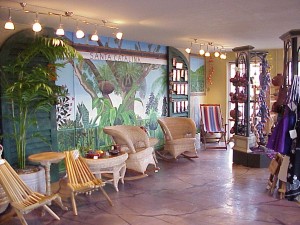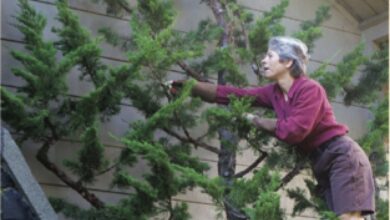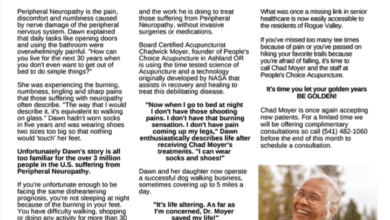NicaNelly: A True Taste of Nicaragua
This month I was fortunate enough to be able to sit down with Jennifer Hanson, owner of NicaNelly in Talent for an interview. I learned loads about coffee, what it means to be a direct trade business and that I can’t wait to visit Nicaragua for myself.
Santa Catalina: How the farm started
About six years ago my father had passed on and about five years ago my mom said “let’s go to Nicaragua and find a little place where I can go and be warm.” So I said “Mom, if you’re going to buy a place, why don’t we get something together and get a little business.” I have always been fascinated by the coffee in Nicaragua. As a teenager I tried Nicaraguan coffee and I thought it was the best tasting coffee I’d ever had, and so I’ve always been kind of hooked on it. We have family down there because my mom was born there. We had family looking for us and they found a little coffee farm that was in distress. Of course they didn’t consider it distressed. I do because there was trash everywhere, and they hadn’t been maintaining it. So what we did was we bought that, went through and cleaned it up and started maintaining it.
From plant to store: How Coffee becomes coffee
How often do you visit the farm?
I went down in November (2008) and then I just went down in February. So, I think a lot of it depends on what is happening with the harvest: November is the beginning of the Harvest season. When we were down in November my husband and I made more drying beds because drying beds are the best way to dry your coffee. So we made more drying beds and got the farm ready for the harvest. We went down in February to get ready for the container. The coffee takes months to process. In February, when I went down, I made sure the final steps of the coffee processing were completed. I also made a pallet for the coffee to sit on so it wouldn’t sit on the floor on the farm. I instructed my farm administrator, Sandra, on how I wanted the coffee packed for the container. While I was there, I also purchased odd items such as concrete planters and little palm trees. These are items that my exporter would not typically assist us in purchasing. So I will collect items that I think will be of interest for NicaNelly and I bring then to my farm for storage while we wait for the other items to be ready. My shipper then comes and packs them.
How do you decide what grade the coffee is?
We go through an intense amount of sorting. What we do is we put all the coffee cherries in a barrel and fill it with water. All of the floaters are bad. So all of the floaters are immediately discarded. Then, they are put into the pulper which separates the cherry from the beans. The pulp is made into fertilizer and the beans are put back into the water barrel: Anything that floats is discarded.
So it is a process of elimination?
Yes. Then it sits over night as it ferments ‘coffee has a natural fermentation process’ and then the worker come back the next morning and the beans are taken over to the drying beds and are turned over every couple of hours as they are drying. It is a very organic process because you sit there with your hands and move the coffee around. I love the feeling of moving the coffee around.
Does your family in Nicaragua help run the farm?
Yes, I have cousins who run my farm. I have so much family down there I can hardly keep track of them. Actually I put a gal in charge (Sandra) which is hard because they are such a male dominated society and look at women as lower class people, and I love that she is in charge. It is perfect for her because she can have her children with her as she is working on the farm and doesn’t have to pay for daycare.
NicaNelly: Nicaragua comes to Talent
A couple of years ago, my husband and I were saying “you know what would be really good, we want to bring our coffee up here to the States because it’s so good and we want to do something with it.” There happened to be an import/export conference in Nicaragua. So we went to that and we learned all these different connections on getting stuff up here and we thought Oh this is cool. Now we know how to get the coffee up here and all this other stuff, but we don’t have any place to put it. My mom had a tenant in this ( NicaNelly) building, and shortly after we came back the tenant gave notice. So everything just fell into place and we figured Hey, let’s go for it and decided to import more.
What does the name NicaNelly mean?
Nica is slang for Nicaraguan so if I were to say I’m a Nicaraguan; I would say “Soy un Nica.” My mom’s name is Nelly and that is where we get the name.
Pottery
Marian _ who is not only the former mayor of Talent, but a lifelong potter had this to say about the pottery at NicaNelly: “I have bought things here whenever I can, because it’s so beautiful and you have some of the best pots in the Valley. I would love for people to come and look at these pots.”
Jicaritas
The interesting thing about Nicaragua is that towns specialize in certain things. San Juan de Oriente you do pottery. Pottery is all over town because that is what they do there. Now the Jicaritas, they come from San Jorge and that is because that is where the trees are. So they (jicaritas) are like little gourds, and if you look at them they are so finely detailed in the way they are carved.
Do they have any meaning?
They give jicaritas to each other (similar to how we give greeting cards here in the States). My uncle had a party and he gave jicaritas to all of his guests as a thank you for coming.
Clothing
In Nicaragua, all of the embroidery etc. is put on the front of a garment only. I have a gal that makes all our clothing for the store. The stuff she makes for me goes all the way around the back because that is what I want. It is interesting, the women and the men, as well as the older children (high school age) they all sit around and sew. It’s kind of interesting to see the men sewing; it is odd because it is a male dominated society, but it is a family business. She also makes our shopping bags. What’s cool about that is she really gets to do her art stuff. No two are alike.
Hammocks
The great thing about these hammocks is the amount of material they put into them. There are three different sizes. I get a lot of firefighters that buy them (the mountaineering hammock) because they are out fighting fires for weeks but have no comfort. We also sell single seat hammocks and baby hammocks.
The Importance of Direct Trade
In terms of imports, there has been a lot of importance place on Fair trade. Your coffee is Direct Trade. What is direct trade and why should people choose something like it or fair trade coffee/items over things that aren’t?
That’s a good question. Our coffee [as well as the other items in our store (over 95% total)] is direct trade, which means the coffee comes directly from the farm to the store. I think we are the only direct trade roasters in Southern Oregon. Direct and fair trade items guarantees a more sustainable life for the people who are growing/making the items. For example, my workers are better taken care of then other people in the area. They all have houses on my farm not shanties or shacks, which is what you see down there. My workers have cinder block buildings with tile floors, bathrooms, running water and electricity, which is what rich people have down there. Over 80% of the population in Nicaragua still cooks off of wood; they don’t have propane and all this other stuff, like refrigeration. My workers also have health insurance, they’re well taken care of, they have a home, a salary and they can eat off of the farm.
So you are helping to improve people’s lives when you buy direct or fair trade?
Yes. One family at a time. In order to be classified as direct trade, you have to be able to go visit the place of origin once a year. Fair trade doesn’t compensate the artisans as much as direct trade, but they are still given a better wage than people who sell directly to the market. I do buy some other coffee here in the states to sell along with my own Catalina. My dark roast consists of Columbian and Peruvian coffee that is organic and fair trade, because it is about sustainability.
You are invited to stop by and sample coffee from Jennifer’s farm and take home some custom roasted beans for yourself: It only takes about 30 minutes to get your custom roast or call ahead and pick it up later!
NicaNelly
301 East Wagner Road
Talent, Oregon
Telephone: (541) 535-2332





